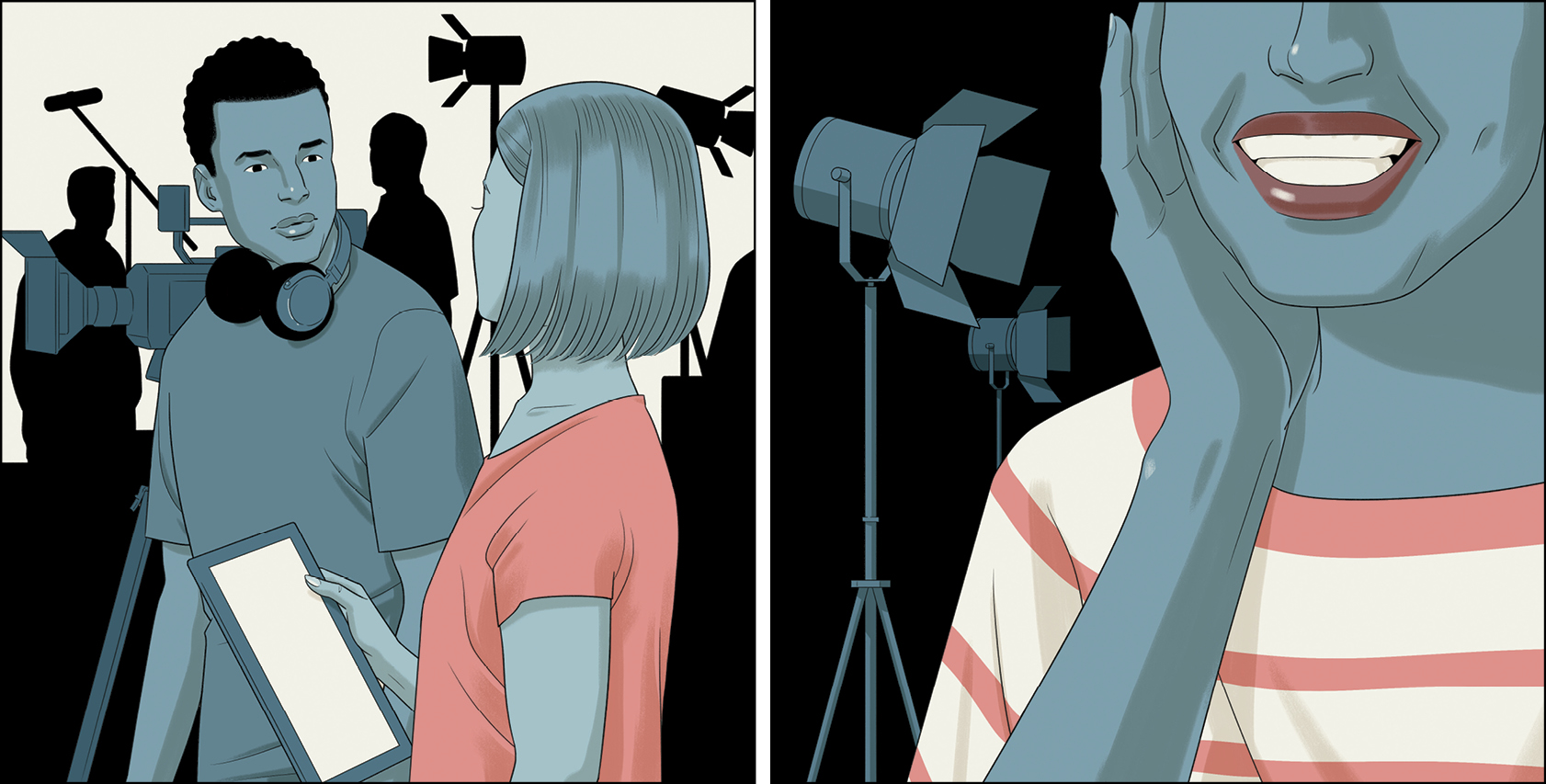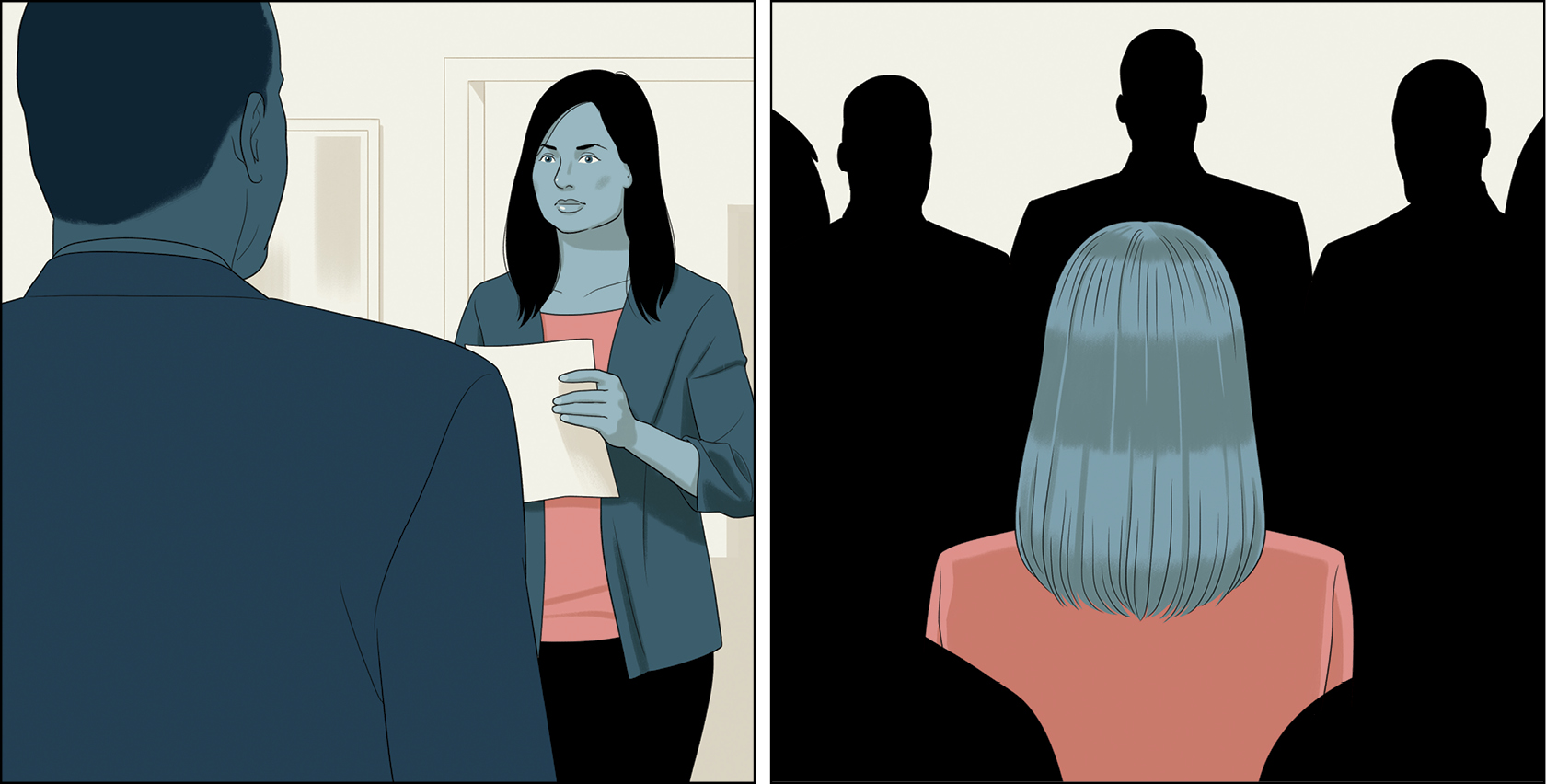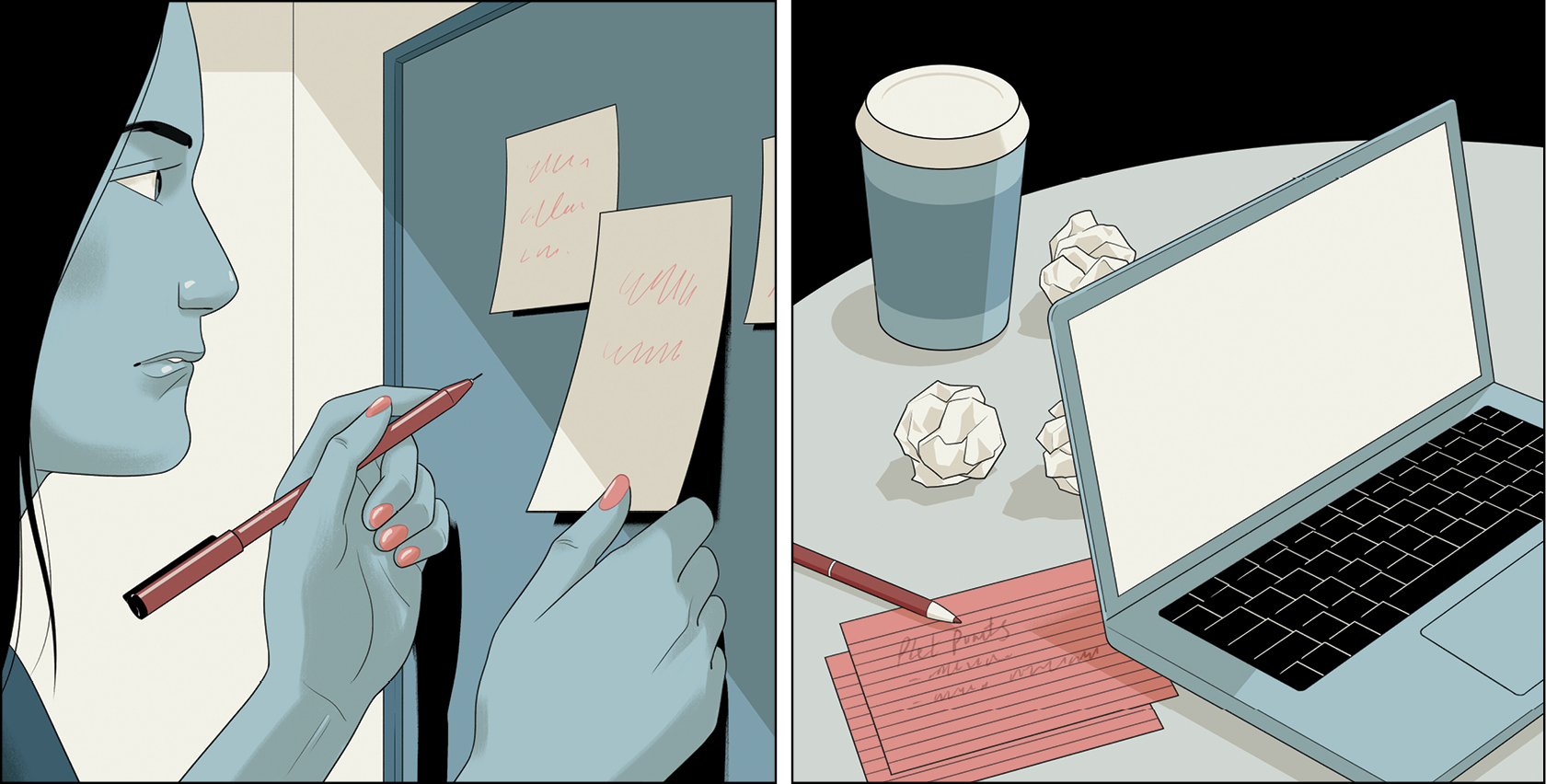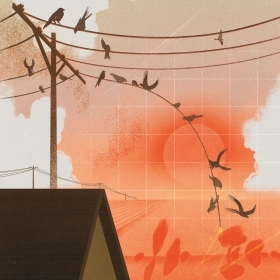A cadre of Wellesley writers are shaping some of your favorite TV shows and relishing the creative endeavor—despite the tremendous uncertainties of their industry
In this era of “peak TV,” as critics have dubbed it, Wellesley writers have been drawn to the industry, and a growing number of them are penning the episodes of your favorite shows.

Anyone who’s struggled to catch up on the latest hit TV shows will not be surprised to learn that last year, there were 532 scripted U.S. television series on network TV, cable, and on services like Netflix, Amazon, and Hulu. This number has been steadily increasing over the last decade—in 2010, the number of shows was only a little more than 200, according to the research department of the cable network FX—as television has become a fertile field for prestige dramas and innovative comedies.
In this era of “peak TV,” as critics have dubbed it, Wellesley writers have been drawn to the industry, and a growing number of them are penning the episodes of your favorite shows. Series that have had Wellesley women behind them include Fresh Off the Boat, Mr. Robot, Fear the Walking Dead, The Resident, The Goldbergs, Speechless, Bluff City Law, Briarpatch, Scandal, 30 Rock, The Bold Type, The Leftovers, Parks and Recreation, and Silicon Valley.
Despite the networks’ and streaming platforms’ hunger for new shows, it is a steep, uphill battle to get a show created or to land a writing position on a series. Amy Holden Jones ’75, co-creator of the Fox medical drama The Resident, describes the odds of getting a new show made this way: There are more than 500 shows being made, but perhaps fewer than 100 are new. Spots for debut shows tend to go to a cadre of known creators, mostly white men—“the established male guys,” Jones calls them. So there might be roughly 25 debut shows available for others. “It becomes unbelievably difficult to break in, unbelievably difficult,” she says. What’s more, “People who hold the power and decide what is good or bad, to an overwhelming degree, can’t tell good from bad. And so you’ll watch over and over when a good piece of work does not advance, and a poor one does, for reasons that are incomprehensible. … The hardest thing about our business is that quality is not always rewarded. A creator who is known, or a pilot with subject matter that’s hot, will often get a pickup over an unknown creator with a great new show to offer.”
When the chances of success are so low, what keeps Wellesley TV writers going? They describe the joy and excitement that comes from collaborating on a creative project that they believe in deeply, and the satisfaction that comes from seeing it come to life and connect with a worldwide audience.
Rachna Fruchbom ’99, who’s written for Parks and Recreation and Fresh Off the Boat, says, “My favorite thing about being in a writers’ room is that your job is sitting with a bunch of people you admire, who are so smart and funny, and you’re just pitching stories and jokes together. And that is a cool way to make a living.”
So you want to be a TV writer
There are two main paths in the television industry. The first is to rise through the ranks on TV shows, starting as a writers’ room assistant and progressing to become a staff writer, then a story editor, a producer, and ultimately an executive producer or a showrunner. The other path, the one that Jones followed, is to begin by simply writing pilots—the first episode of a TV series that’s used to sell the show to a network. She was able to do this because she had already made a name for herself as a screenwriter for films including Mystic Pizza, Maid to Order, Indecent Proposal, and Beethoven. She originally wanted to be a director, but quickly discovered that Hollywood was not supportive of female directors. “I started to get writing assignments, because it was acceptable for women to be writers. Not at parity. There were many, many more men. But the director would be a guy, and then the person at his elbow could be a woman,” she says.
By the early ’00s, when mobster Tony Soprano was seeking treatment for panic attacks in the seminal HBO show The Sopranos, marking the beginning of the prestige television era, Jones decided to make the leap to the small screen by writing pilots. It can be a lucrative business, Jones says, but it’s also a longshot one. A network might buy 60 drama pilots, and of those, it will shoot anywhere from four to 10, usually. Of those that get shot, as few as three or four will make it on air. “The world is littered with what they call ‘dead pilots.’ You put all this work into it, and it’s over,” she says.
One of the many pilots Jones wrote, a drama about Harvard Medical School students, got as far as being shot, but never made it on air. Not long after, another show she created, Black Box, a psychological medical drama, aired for one season before being canceled. “So I was pretty discouraged by this time … and was considering giving it up,” she says. But then she read Unaccountable: What Hospitals Won’t Tell You and How Transparency Can Revolutionize Health Care by Martin Makary, which inspired her to create a series called The Resident. The show focuses on the problems with the medical system in the U.S. and the struggles that new doctors face as they fight to keep their ideals within a flawed and dollar-driven health-care industry.
Several networks were interested in The Resident, and Fox picked it up. “Fox was petrified from the beginning, because medical shows were all about doctors having love affairs. … They were not about problems in medicine. But I was driven very much by the nonfiction,” Jones says. “We had a real theme, and Fox fought it for quite a while. They said, ‘Make it more like The Good Doctor. Make it more like This Is Us.’ But eventually, they came to realize that it was something unique, and by the end of the first season, we were rocking. So now we’re hopefully looking at season four.”
Jones entered the television industry as a show creator, but most TV writers start at the other end of the food chain. In 2012, French major Haley Harris ’12 stood at the podium in the Academic Quad as student speaker at commencement and proclaimed, “My fellow seniors, I’m scared. … Honestly, I couldn’t think of a lone job title I would be happy to hang my hat on—barring, of course, playing a lady detective on a long-running television show.” After she delivered that speech, she went home to Chicago and worked for an economist, then did a six-month stint working for the San Francisco Opera, and returned to Chicago to work for the economist again while she “hosted live trivia and did lights and sound for a drunk improv show,” she says.
Meanwhile, Harris was applying to entertainment industry jobs in Los Angeles and getting nowhere. She was investigating joining the police academy—the “lady detective” quip wasn’t entirely a joke—when L.A. called. Through networking and serendipity, she landed a job as a writers’ production assistant for The Leftovers, an HBO supernatural drama based on the Tom Perrotta novel of the same name, which follows the struggles of people left behind after 2 percent of Earth’s population suddenly disappears.
Harris’s job entailed doing “everything that nobody else wants to do,” she says, and she adored it. She got coffee, ordered the writers’ lunches, and cleaned the kitchen, but she also watched the dailies (the raw, unedited footage from a day’s shoot) and did some research. “I got to look up all the times someone had been stoned to death in the past five years and why. There were a lot of times when I had to go find a biblical passage that was a good reference for someone that could then be their character’s house address,” she says. She put together a book listing everyone who had been mentioned as being among the disappeared on the show, to serve as a reference for the writers. The next season, she became a writers’ assistant, taking notes in the writers’ room. The season after that, she was hired as a staff writer. “I lucked out hard core. I like to say that I did the struggling before I came to Los Angeles, because it took me a while to get on this path,” she says.
Arguing about imaginary people
Writing for television is different than writing for most other media in that it is intensely collaborative. Kate Erickson ’05, who has written for shows including Mr. Robot, Fear the Walking Dead, and The Passage, vividly recalls a moment soon after she got a job as an assistant to the showrunner of Copper and Borgia. Before that job, she knew she wanted to be a writer, but had never considered television. One day, Erickson overheard the showrunner speaking with one of the writers in the hallway. “They were arguing about what a character would do. And they were each very passionate about the character’s motivations and what their backstory would mean for what they’re doing now. And the conversation went on and on, and I was like, ‘Oh my God, they’re arguing about imaginary people. That’s their job.’ … All I wanted to do in that moment was be in a position to argue about imaginary people one day,” she says.
These intense discussions about imaginary people begin after a network picks up a show. Then, writing staff are hired and the show gets its own office space. “Typically, [the writers] have individual offices, and there’s a conference-room type office with a big table, and everybody sits around it,” Erickson says. “You get there, and there’s a whiteboard, and there’s lots of index cards, and you usually ‘blue sky.’ You talk about all the big ideas, and who the characters are, and what the studio wants out of the show. You lay out all the big expectations and hopes and dreams and general understandings of what’s happening [in the show]. And then you start working the episodes one by one.”
Broti Gupta ’16, who has written for comedies including Friends From College, Speechless, and Carol’s Second Act, says while each episode is credited to an individual writer or a pair of writers, that’s very misleading. “OK, this person’s name goes on the script because they wrote the first draft,” which was based on the group’s ideas, she says. “That [draft] was then completely rewritten by this group of people. So it is hugely collaborative, and we are very lucky that we have super talented writers’ assistants who do basically all of the typing, and they have to write whatever garbage is coming out of our mouths as a group of people.”
‘Being in a writers’ room is a very vulnerable thing, because a lot of it is sharing your personal stories.’
Gupta, who got her start while still at Wellesley, contributing to comedy websites like College Humor, McSweeney’s, and the New Yorker’s Shouts & Murmurs site, says that writers tend to bring their own experiences to their work. “Being in a writers’ room is a very vulnerable thing, because a lot of it is sharing your personal stories. And as a group of comedy writers, you always reshape whatever trauma happened to you as hilarious. And so it’s a lot of sharing those episodes of your own life to see how they can support the showrunner’s vision for the entire show,” she says. “I always say that being in a comedy writers’ room is sort of like being in group therapy but if, as a group, you wanted to get worse.”
Lynn Sternberger ’07, who’s written for dramas including Heartbeat, The Bold Type, and Bluff City Law, says that she particularly enjoys the “jittery enthusiasm” that comes during the blue-sky phase, when the writers’ room brainstorms the journey each character will take. “I love that part, because I often feel like my voice is really valuable then. I’m often one of the younger writers. I’m often the only queer woman. So if there’s a queer character or if there’s a potential to tell a story that I’m really excited about, I try to get it in early,” she says.
One episode Sternberger wrote for The Bold Type was an homage to the indie romance Before Sunrise. In the episode, two women who had a “will they or won’t they” dynamic spend a romantic 14 hours together in an airport after one of them, an Iranian artist, is unable to enter the United States due to issues with her visa. “It is my favorite thing that I’ve been able to write. And it’s not just because it was wish-fulfillment for me as a queer woman who had gone through a multinational relationship that involved immigration. All of the things about that episode were extremely personal to me. But the outreach from fans to me specifically after I wrote it was really incredible,” Sternberger says.

The Certainty of Uncertainty
Wellesley television writers say that one of the most challenging aspects of the industry is the uncertainty: not knowing whether you’ll get staffed on a show, whether your show will be picked up, whether it will be renewed. (And, after this story was reported, all the uncertainty created by the coronavirus.) After The Leftovers ended, it was 2½ years before Haley Harris got her next staff writer position, on Briarpatch. “This is why you really have to love it, because it’s such a dumb job to pursue. There’s no security. There’s no control over it, especially for us Wellesleys who are pretty type A. You don’t get to decide your fate. There’s only so much that you can do to make yourself hireable, and that’s agonizing,” she says. The Writers Guild of America negotiates rates for TV and film writers that are high enough to float writers through a certain amount of unemployment and provides health insurance. But financially and emotionally, the profession can be very difficult.
Shukri R. Abdi ’01, who’s written for the upcoming AMC series Kevin Can F—Himself and BET game show Black Card Revoked, tells a story about a time she almost got a staff writing job—but then didn’t. After getting the bad news, as she folded laundry at home in misery, her boyfriend suggested that instead they go for a walk or a run at Silver Lake Reservoir in L.A. “We started walking, and he said, ‘Do you want me to walk with you?’ And I said, ‘No, why don’t you go ahead and run around, because I plan on crying very loudly while I’m walking, and if you’re walking with me, people are going to stop you and ask you what you did, because that’s how loudly I’m about to sob,’” Abdi says, and does a hilarious impression of herself wailing while jogging, illustrating that comedy-writer trick of turning tragedy into comedy. “It’s nothing till it’s something. … You just gotta bend like the blade of grass,” she says.
And of course, being a woman adds another layer of challenges. “The struggle of being a woman in [the industry] was close to impossible [to bear] until, say, the last four or five years,” says Amy Holden Jones ’75. “And it’s only begun to change very recently. I’ve seen an endless number of women be passed over in favor of less talented guys, and it’s enough to break your spirit when it goes on for 30 years. But it still exists today, unfortunately, particularly when it comes to the biggest, most powerful jobs like show creator, executive producer, or showrunner. It’s getting better, but it still exists.” According to a 2016 report from the Writers Guild of America West, 29 percent of television writers were women and 13 percent were people of color.
After the #MeToo movement, “the door blew wide open in terms of what you can talk about and what you can acknowledge” in terms of sexual harassment, says Kate Erickson. But that didn’t make it disappear. Last September, while Broti Gupta was a staff writer on Carol’s Second Act, she formally complained that an executive producer had inappropriately touched her on two occasions. Gupta said she didn’t want him fired; she wanted him to go through sexual harassment training. But after subsequent changes on the show, Gupta felt she was being retaliated against, and left. The New York Times wrote about it in a Nov. 16, 2019, article, “Two Female Writers Quit Patricia Heaton’s CBS Show After Making Complaints.”
The experience was particularly traumatic, Gupta says, because of how her two female bosses handled it. “I think there is still this fear of losing power. … And that results in these panicked decisions that my female bosses made,” she says. However, she says she’s been heartened by all the support she’s received since. “The number of people who reached out to me and said just the most generous and kind things, like, ‘You’re setting an example for us,’ and things like that, it really did feel like I was just unlucky to have dealt with those particular women, but that the industry as a whole, maybe—and maybe this is wishful thinking—but that the moral arc is bending more toward good than not.”
Wellesley writers of color say that another frustrating aspect of the industry is the many straight white men who complain that “diversity hires” are taking their jobs. “It’s like, ‘No, dude, other white men are taking your jobs. There are so many of you,’” says Rachna Fruchbom. “It’s like that saying, privilege is when equality feels like oppression. … I think that, as a woman, as a person of color, as a mom, representation is low. [But] the more you have creators that encompass a fuller spectrum of who people are, the more shows you have that are more reflective of different perspectives and experiences.” One of the shows Fruchbom wrote for, Fresh Off the Boat, a comedy about a Taiwanese-American family in Orlando, Fla., in the 1990s, is an example of that—it was created by Nahnatchka Khan, whose parents immigrated to the U.S. from Iran.
With all these challenges, Wellesley alums in Hollywood need all the support they can get. Not surprisingly, they often look to each other. Wellesley in Entertainment, a Shared Interest Group that’s a subgroup of the Wellesley College Club of Los Angeles, offers social hours, networking opportunities, creative and business panels, and a screenwriting competition for graduating seniors. Rachael Labes ’20 won this year’s competition. “I’ve always considered art a big part of my life, and I love making people laugh—I’m also president of Dead Serious, Wellesley’s improv group. Right now, I think there’s a lot of opportunities for TV and film writers. It’s an exciting time to be in the industry,” she says.
Wellesley television writers say that once you’re in the writers’ room, it is extraordinarily exciting. “The reason I’m a television writer is because being in a television writers’ room is like being in the coolest English class you ever had, where you’re talking to all of the most intelligent people you’ve met about what story you want to tell,” says Haley Harris. “What I love about it is the collaboration, getting to hear all of these cool ideas. And that moment when someone pitches something, you go, ‘Yes, that’s what we should be doing. Let’s do that.’”
Lisa Scanlon Mogolov ’99 was thrilled to write a story that combines two of her favorite things, Wellesley and TV. The last time these two interests intersected was when she and her dormmates binge-watched VHS tapes of The X-Files.




